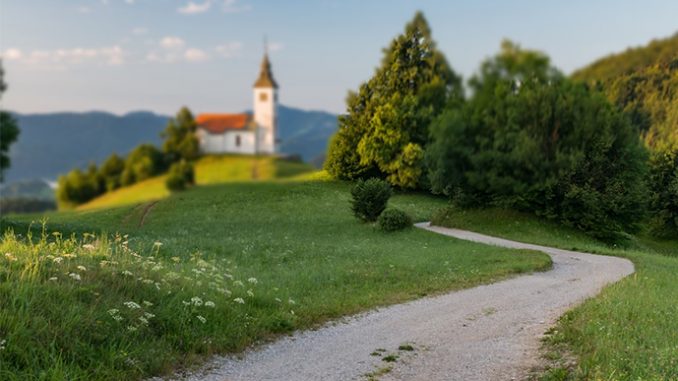
In my last column, I reflected on Pope Leo XIV’s approval of a new liturgical formulary, the Mass for the Care of Creation, highlighting the rich opportunity it affords to renew the Church’s liturgical prayer by reclaiming its integral connection with the created order. Now, with the official promulgation of Leo’s first message for the World Day of Prayer for the Care of Creation on September 1st and the homily he delivered at the inaugural celebration of the Mass for the Care of Creation on July 9th, we get a deeper picture of how the new pope sees this renewal extending beyond the sanctuary and into the wider world.
Picking up where Francis’s Laudato Si’ and Laudate Deum left off, Leo offers a vision of creation care that is biblically grounded, theologically rich, Christocentric, deeply human, and demanding in the face of today’s global realities. As I hope will be clear in what follows, an attentive reading of his words reveals a clear continuity with his predecessors, even as they bear the fresh imprint of Leo’s own emerging voice as pope.
Highlights from Pope Leo’s Message
Leo opens his message with two quick programming notes. First, he highlights that this year holds special significance for creation care, marking the 10th anniversary of Pope Francis’s landmark encyclical Laudato Si’ and thus the 10th anniversary of his establishment of the World Day of Prayer for the Care of Creation. Second, he explains that he elected to run with the annual theme chosen in advance by the Argentine pontiff: “Seeds of Peace and Hope.”
From the outset, I was eager to see how Pope Leo would approach this topic, hoping he would do something interesting from a biblical perspective. It was heartening to see him turn immediately to John 12:24: “Truly, truly, I say to you, unless a grain of wheat falls into the earth and dies, it remains alone; but if it dies, it bears much fruit.” The pope could have taken this verse in several different directions, but the first thing he observes about seeds has to do with how, having been buried in the earth, “life springs up, even in the most unexpected places, pointing to the promise of new beginnings.”
Having just re-watched Jurassic Park with my kids, I couldn’t help but hear in these words the echoes of Ian Malcolm’s iconic line: “Life finds a way.” At any rate, seeing as this is obviously not what the pope has in mind, we should identify his real concern—namely, how our efforts to sow seeds of peace and love now—by inhabiting creation according to God’s plan, can foster peace and renew hope, even if it “may well take years for this plant to bear its first fruit.” In keeping with Leo’s approach, we’ll return to this analogy of the seed at the conclusion of this reflection.
The pope underscores that tending the garden of creation is not a solitary task but a lifelong commitment that unfolds within a larger context of communion and shared responsibility—“an entire ecosystem made up of continuity, fidelity, cooperation and love, especially if that love mirrors the Lord’s own self-sacrificing Love.” Leo doesn’t quote it in this message, but it is clear that he stands with his predecessors in affirming what I’ve stressed before in this column: the fundamental importance of the “covenant between human beings and the environment, which should mirror the creative love of God, from whom we come and towards whom we are journeying.”
While it wasn’t stated outright in his opening address, it was a delight to see this covenantal theology receive more direct expression in Leo’s homily during the inaugural Mass for the Care of Creation, where he proclaimed, “The unbreakable covenant between Creator and his creatures inspires our minds and galvanizes our efforts to ensure that evil may turn into good, injustice into justice, and greed to sharing.” In view of this, it’s clear that Leo stands firmly in line with prior magisterial teaching in its insistence that living our vocation as protectors of God’s handiwork is “essential to a life of virtue” and therefore “not an optional or a secondary aspect of our Christian experience” (a reference to Laudato Si’, §217).
Another point of continuity with the ecological vision of the last three popes is how Leo looks to the two creation accounts in Genesis for insight into our vocation as stewards of the earth. As he looks upon the various “wounds” inflicted on the earth by human sin, Leo remarks that this is “surely not what God had in mind when he entrusted the earth to the men and women whom he created in his image.” Referencing the formation of man and God’s command to subdue the earth and have dominion over it (Genesis 1:24–29), the pope teaches that the Bible “provides no justification for us to exercise tyranny over creation” and that these scriptural texts must “be read in their context, with an appropriate hermeneutic” (references to Laudato Si’, §200 and §67). Turning immediately to Genesis 2:15, the pope emphasizes that, rightly understood, man’s vocation to “till” and “keep” the “garden of the world”—first issued to Adam but shared by all who come from the same adamah—is not a license for exploitation, but a matter of “protecting, overseeing and preserving.” He then goes on to insist that this calling is for us a “duty born of faith”—one that is all the more poignant seeing as “the universe reflects the face of Jesus Christ, in whom all things were created and redeemed.”
This is brilliant: Leo not only finds the basis for the imperative to safeguard God’s handiwork in the Old Testament but emphasizes that it carries even greater weight with the revelation that the entire cosmos is ennobled because it bears the imprint of the Logos, in whom all things were created and in whom all things hold together (Jn 1:1–3; Col 1:15–20). Moreover, as I discussed in my last column on the new liturgical formulary approved by Leo, our calling to exercise faithful dominion over the earth draws vitality from the Catholic tradition’s conviction that Christ has redeemed the entire created order, which will be glorified with us.
I find that the N.T. Wright captures this well when he asks rhetorically, “Why wallpaper the house if it’s going to be knocked down tomorrow?” or, “Why oil the wheels of a car that’s about to drive over a cliff?” It’s difficult to muster the effort to care for the present cosmos if we conceive of it as fundamentally fallen and destined to pass away, a realm from which to escape. Thankfully, the precise opposite is the case: Rather than extracting us from creation, the Kingdom draws us more fully into it, exalting both us and everything else that God has made.
Continuity of Papal Teaching on Creation and Climate
All the above applies to our vocation in the world broadly, but to represent Leo’s concerns accurately, it should be noted that he has climate issues particularly in view. If it wasn’t already clear what his position was on global warming, it is now, as he explicitly refers to “extreme natural phenomena caused by climate change provoked by human activity.” Likewise, in the homily delivered during his inauguration of the Holy Mass for the Care of Creation, Leo spoke of the “many natural disasters we see occurring almost daily in our world, in so many places and countries [which] are also in part a result of the excesses of human beings and our lifestyles.”
In making these remarks, Leo again positions himself squarely within the tradition of other recent popes on this matter. As is well known, Pope Francis spoke in a similar vein, issuing urgent and blistering messages at the 2023 COP28 convention, in his encyclical Laudato Si’, and in his apostolic exhortation Laudate Deum. It is less known, however, that John Paul II and. Benedict XVI sounded the same alarm. As a case in point, the Bavarian pontiff broached the topic in his 2009 message for the World Day of Peace and this speech to members of the Vatican diplomatic corps, while the Polish saint’s 1990 message for the same occasion warned that the greenhouse effect had “reached crisis proportions.”
Regardless of where one sits on the highly charged subject of anthropogenic climate change, I think it’s crucial here that we strive to refrain from the knee-jerk reactions so common online today. Perhaps like some other readers, I’m fully aware of the complexities involved with judgments in this domain and have at times offered my own critiques of insufficiently nuanced approaches to climate change. By the same token, however, it’s important to take care lest our response to the Church’s consistent message over the past three decades be shaped more by personal preference or ideology than by our Catholic identity.
It’s Not Just About the Climate
While it’s undoubtedly true that climate change has been a major concern for recent pontiffs—especially Francis, and now seemingly Leo—it is by no means their only one.
For instance, after issuing a strong rebuke concerning human contributions to climate change, Leo laments other pressing issues—matters whose importance, I’ve found, is too often sidelined in our culture amid an intense preoccupation with global warming. Significantly, Leo brings up the long-term ecological devastation wrought by armed conflicts and any number of situations where God’s good earth is “reduced at times to a bargaining chip, a commodity to be bartered for economic or political gain.” He elaborates, “We see this in agricultural areas and forests peppered with landmines, ‘scorched earth’ policies, conflicts over water sources, and the unequal distribution of raw materials, which penalizes the poorer nations and undermines social stability itself.”
Connected to this last point, Leo places special emphasis on solidarity—that “the destruction of nature does not affect everyone in the same way.” Referencing indigenous communities as being especially emblematic of this asymmetrical pattern, Leo adds: “In a world where the most vulnerable of our brothers and sisters are the first to suffer the devastating effects of climate change, deforestation and pollution, care for creation becomes an expression of our faith and humanity.” In saying this, Leo underscores yet another theme consistently echoed by recent pontiffs, which is the unfortunate truth that the poor tend to suffer most when environmental problems surface. For instance, Francis pointed to the depletion of fish stocks in small communities that lack the means to replace their natural resources, as well as water pollution and rising sea levels, which “mainly affect impoverished coastal populations who have nowhere else to go.”
This broad concern for the exploitation of the earth and its poorest is likewise evident in the pontificates of Leo’s earlier predecessors. For instance, John Paul II identified environmental pollution as “the most profound and serious indication of the moral implications underlying the ecological problem,” sorrowing over the “contempt for man” shown when profit seeking takes priority “over the good of individuals and even entire peoples.” In light of this, the great pope concluded, “The ecological crisis reveals the urgent moral need for a new solidarity, especially in relations between the developing nations and those that are highly industrialized.”
Benedict XVI was even more explicit in this regard, as he connected the issue of climate with a wide array of other critical issues: “How can we not mention the food crisis and global warming, which make it even more difficult for those living in some of the poorest parts of the planet to have access to nutrition and water?” He then proceeded to enumerate a host of issues as part of a single, interrelated problem—“such realities as climate change, desertification, the deterioration and loss of productivity in vast agricultural areas, the pollution of rivers and aquifers, the loss of biodiversity, the increase of natural catastrophes and the deforestation of equatorial and tropical regions.”
This trajectory of criticism and ecological concern can be traced at least as far back as Pius XII in 1946, with conceptual foundations in Pope Leo XIII’s 1891 Rerurm Novarum. Pius condemned the unprincipled schemes of bad actors, lamenting that in his day they often made rural populations “the unwitting victims of exploitation and slaves to a domination from which they would have instinctively shrunk.” In remarkable detail, he also enumerates “the actual sins of humanity have caused the curse to weigh upon the earth with increasing heaviness,” including a litany of ways that evil perpetrated by man has led “Mother Earth” (a personification with deep historical precedent) to rebel against us. In words that could easily be mistaken for something written by Francis or Leo, he laments:
The soil has suffered successive scourges of every kind-floods, earthquakes, pestilence, devastating wars, and land mines. In some places, it has become sterile, barren, and unwholesome, and has refused to yield to man its hidden treasures. The earth is a huge, wounded creature; she is ill.
In concluding, Pius offers a wise reminder: good intentions are not enough to remedy these problems. It is not enough to love our land, he says: we must gain the expertise necessary to care for it, seeing as doing so “require[s] wide and varied knowledge and information.”
Conclusion
To grasp the full significance of Pope Leo’s vision of creation within the broader Catholic tradition, it is useful to consider it in relation to the teachings of previous popes, as I have briefly attempted to do above. Further, we must recognize that this exhortation to stewardship is not merely about environmental preservation, but about embracing what his predecessors have called an integral ecology—a holistic vision that sees the interconnectedness of all life, including the most vulnerable humans in our midst, with a special emphasis on the dignity of the unborn.
In this light, authentic creation care cannot be separated from our broader pro-life commitments, for every ecological crisis is ultimately a human crisis. I haven’t had space to explore all of that here, but readers interested in learning more can find further commentary in this book. For present purposes, suffice it to say that most Catholics in the circles I frequent have greatly appreciated our recent popes’ teachings on these subjects, but less so when it comes to creation.
Keenly aware that prior efforts by Roman pontiffs in the area of ecology have not been uniformly welcomed, Leo concludes his message praying that “integral ecology be increasingly accepted as the right path to follow.” It’s a point he also made in his homily inaugurating the new formulary for the Mass of creation, where he added that “we should pray for the conversion of the many people, inside and outside the Church, who do not yet recognize the urgent need to care for our common home.”
But, to return to the seed imagery with which this meditation began, we see that Leo’s summons to embrace creation is closely tied to his tropological reading of the seed that must die to bear fruit. This truth proclaimed by Christ is at once a truth of nature and an allegory of the Paschal Mystery, but it is also something more. As Leo puts it, “In Christ, we too are seeds.” In this light, Leo prays that we who follow the way of Jesus may ourselves be “seeds of peace and hope” whose sacrificial love contributes to the flourishing of all life as we inhabit creation according to the mind of Christ.
Appropriately, then, the Holy Father concludes on a Christological note, reminding us that the seeds of our lives will flourish only insofar as they are “‘tilled and kept’ by the grace of our great and unfailing Hope, who is the risen Christ.”
If you value the news and views Catholic World Report provides, please consider donating to support our efforts. Your contribution will help us continue to make CWR available to all readers worldwide for free, without a subscription. Thank you for your generosity!
Click here for more information on donating to CWR. Click here to sign up for our newsletter.












